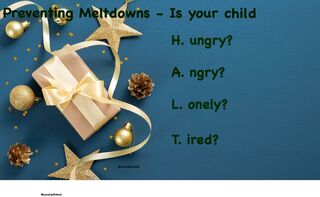Sleep
Handling Kids' Meltdowns When Holidays and COVID Collide
When everything changes—use this AA shorthand to keep chaos at bay.
Posted December 20, 2021 Reviewed by Ekua Hagan
Key points
- When schedules and routines are undone by holidays or other events like the COVID surge, it's easier to lose track of one's own needs.
- Kids aren't so good at expressing their needs sometimes, especially if they are already uncomfortable.
- Checking in on basic human needs like hunger can help avoid meltdowns. The HALT model from AA reminds everyone to check in.

My youngest (now grown up) threw a lot of tantrums as a child. She struggled with ADHD and was emotionally sensitive and reactive. After she finally settled for bed, drained from a day of dysregulation, I would cry myself to sleep. I felt so bad when I lost my cool with her, but even more importantly, it didn’t work—it didn't help get things done, and it definitely didn't help her get better at managing big emotions.
One afternoon right before Christmas, in the Costco parking lot, things were escalating quickly. I don’t know why I had to bring her with me or why I had to shop at that moment—but it occurred to me that we had gone straight from preschool to the store and she hadn't had her usual snack. After this lightbulb moment, I pushed my cart, back across the endless expanse of people and vehicles, and sat in the car with her while she had a snack. Within 10 minutes she was herself again.
Now maybe it should have been obvious to me that she was hungry—but she hadn’t said anything. And I was focused on my shopping task. But once I made that discovery, whenever she started to dysregulate my first question was, “When did this child last eat?" I always asked her directly too—but she didn’t always realize she was hungry—or was already distressed enough that she couldn’t get out much more than “No” or “I hate everything” or something like that.
Changes in routines increase chances of internal distress
I find that kids who have been making progress and have been having fewer outbursts are more likely to relapse over vacations and holiday breaks. We expect them to be happy because of vacation and fun activities, but at the same time sleep routines change, as do meal and snack times. If travel is involved, there is a lot of stimulation and change all around, and, especially at the holidays, environmental stimulation is in overdrive—lights, music, hustle and bustle. All of these things increase the likelihood that a child's internal environment gets disrupted or distressed—which makes a meltdown all the more likely.

And in this COVID-19/pandemic world, our lives change continually, often abruptly and unpredictably, leaving schedules and plans in shambles. This creates another layer of external changes that crank up childrens' chances of internal changes and discomfort. This further lowers their threshold for getting overwhelmed by their emotions.
Of course, adults are also navigating changes and new demands that disrupt our schedules and might make us more likely to get less sleep, miss a meal, or get overstimulated. It happens to us too. When everyone is pushed to the edge of their bodily needs, emotional management systems don't have much fuel to run on.
HALT—the 12-Step shorthand that works for emotional dysregulation too
Over the course of my work with families—and in raising my amazing, (and emotionally reactive) child—I came to realize how critical it is to check on a child's (or teen's) basic human needs before assuming their emotional dysregulation is a behavior problem. Are they hungry? Tired? Overstimulated? In pain? Scared? Needing a hug? When I coach parents (and for many years in my own parenting) I dial into these questions as essential first steps with a distressed or irritable child. It doesn’t eliminate every outburst—but it defuses many of them before they get out of hand.

In using this model, I am reminded of the acronym “HALT”—a phrase used in 12-step programs. It stands for “Hungry, Angry, Lonely, Tired.” For 12-step members, it’s a quick reminder of key factors that can trigger an urge to drink or use. Those physical and emotional needs can derail someone’s sobriety. Taking care of them reduces the likelihood of relapse. In children whose emotions tend to explode easily, recognizing and remediating key factors that increase the likelihood of emotional outbursts significantly reduces the risk of such events.
In children and adolescents, their emotional regulatory systems are still developing—they don’t have the buffer to tolerate distress that comes with maturation. So a trigger like hunger or being overstimulated by noises or people will be a much bigger problem for a child than for an adult. And for children with underlying difficulties in their emotion regulation systems, the problems can become even more extreme.
Emotional regulation skills vary over time and from child to child
Kids are still developing the systems that help with getting their needs met and tolerating discomfort. An infant, for example, can only cry to express any kind of need. As kids develop language, they get better at telling us what’s going on. But when they are tired, in pain, or hungry—their newly developed language skills regress—and they have a much harder time letting us know how they feel. That’s why we can’t always rely on kids to tell us what they need—we have to work on paying attention and knowing some of the most likely causes of their distress.
Humans vary widely in their ability to tolerate internal experiences like hunger. Some people don’t notice it much at all until they are very starving. Others are aware of the earliest gut rumble. Kids are the same. Some of them show a mood change as soon as they are a little bit hungry. Some don’t show much until they have gone hours without eating. Knowing your child’s patterns is part of this process.
HALT for ourselves first

HALT reminds us to stop and pay attention to possible internal cues/needs that could be causing our child to be upset and trending toward a meltdown. It’s a great reminder for ourselves as well, especially around the holidays, when schedules are disrupted and there’s lots of additional stimulus plus extra demands. We might not realize that we are hungry or tired or overstimulated. And with the level of distress in our life escalating exponentially as COVID surges again, keeping an eye on our own internal needs is essential if we are going to help our kids manage theirs.
Like they say on the airplane—if you are traveling with small children, put on your own oxygen mask before taking care of theirs. You won’t be able to care for them if you can't breathe. So HALT for yourself. HALT for your child. Don’t forget to make sure your child—and you—are fed and rested, hugged and hydrated, before taking on the next challenge in your day.




